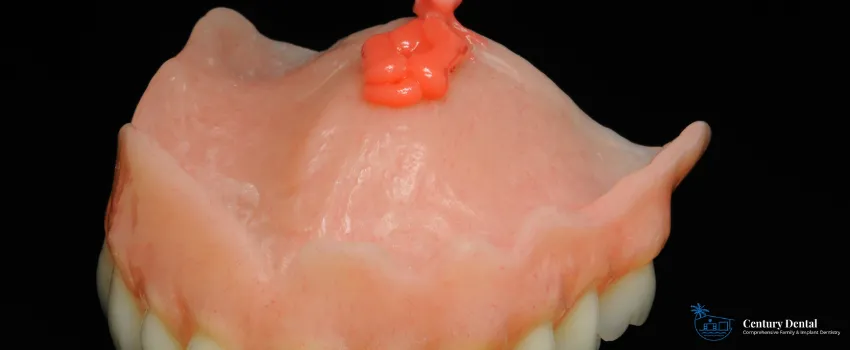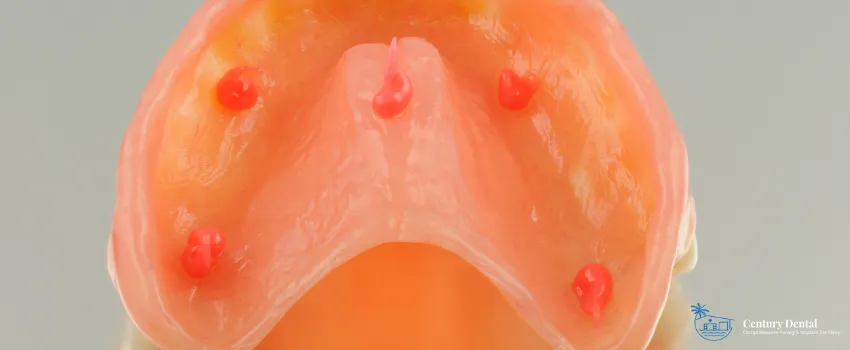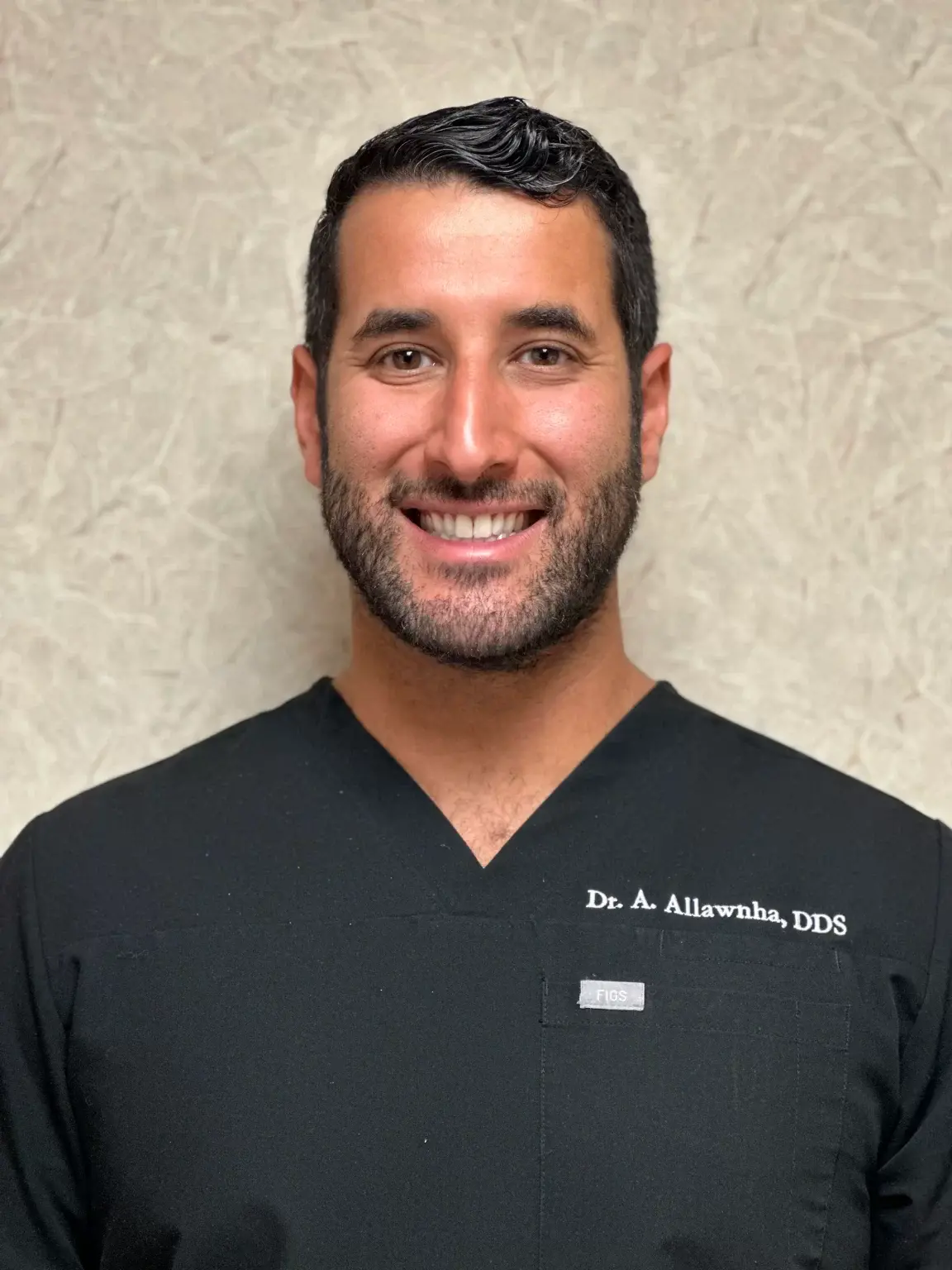Getting used to wearing dentures takes time and patience. One way to ensure a comfortable and secure fit is by using denture adhesives. These adhesives can enhance the stability of your dentures, preventing them from slipping or moving while you eat, speak, or laugh. But, like any other product, using them without proper knowledge can lead to problems.
So, let’s dive deeper into the world of dental adhesives and learn the best practices for using them.
What are dental adhesives?
Denture adhesives (also known as dental adhesives) are products designed to hold dentures in place. They come in different forms, such as creams, powders, and strips, and are applied to the base of the dentures, which are then placed on the gums. The adhesive creates a bond between the dentures and the gums, providing stability and reducing movement.
What are the best practices when using denture adhesives?
Using denture adhesives can significantly improve the fit and function of your dentures. To ensure their practical use, here are some of the best practices when using dental adhesives:
1. Clean your dentures thoroughly before application.
Before applying adhesives, it is essential to clean your dentures thoroughly. This removes any food particles, plaque, or bacteria that may affect the adhesive’s performance. Use a denture brush or a soft-bristle toothbrush to clean all surfaces of the dentures, including the gums, and rinse them well.
2. Start with a small amount.
When using dental adhesives for the first time, starting with a small amount is recommended. The precise instructions may vary depending on the brand and type of adhesive, but generally, a pea-sized amount or a thin strip is sufficient.
3. Apply the adhesive in the right places.
To achieve the best results, apply the adhesive in the proper locations. It should be applied to the parts that come into contact with your gums and the underlying bone. Avoid using the adhesive too close to the denture’s edges to prevent oozing when inserted into your mouth.
4. Avoid excessive use of the adhesive.
More is not always better if you want to secure denture adhesives. Excessive use of the adhesive can lead to oozing, discomfort, and an unnatural feeling in the mouth. If the recommended amount of adhesive does not provide the desired comfort and stability, it is best to consult your dentist for adjustments.
5. Schedule regular dental check-ups.
Regular visits to your dentist are essential, even if you wear dentures. During these check-ups, your dentist will assess the condition of your dentures, the health of your gums, and any remaining natural teeth. They can make any necessary adjustments to ensure a proper fit and recommend any changes in your denture care routine, including using adhesives.
What is the safest denture adhesive to use?
When it comes to dental adhesives, safety should be a top priority. While different people may have different reactions to various adhesives, some key factors must be considered in determining the safest option for you.
The following are the different types of denture adhesives that are generally safe to use:
1. Zinc-Free Denture Adhesives
In the past, some adhesives contained high levels of zinc, which, when used in excess, could lead to serious health problems. However, these cases are rare, and most dental adhesives on the market today are zinc-free or contain minimal amounts within safe limits. If you’re concerned about the potential risks of zinc, look for adhesives explicitly labeled as “zinc-free” to eliminate doubts and ensure your safety.
2. ADA Seal of Acceptance
Another way to identify a safe denture adhesive is by checking if it has the American Dental Association (ADA) Seal of Acceptance. If an adhesive carries the ADA Seal, it has undergone rigorous testing and has been proven safe and effective for its intended use.
While the seal is not mandatory, it is a reliable indicator of a product’s safety and can give you peace of mind when using the adhesive.
3. Hypoallergenic Denture Adhesives
If you have a known sensitivity or allergy to certain ingredients, choosing a hypoallergenic denture adhesive is essential. These adhesives are specifically formulated to minimize the risk of allergic reactions. To find a hypoallergenic option, carefully read the product labels and look for adhesives free from common allergens, such as fragrances and certain chemicals.
4. Recommendations From Your Dentist
It’s always a good idea to consult your dentist when selecting dental adhesives. They are familiar with your dental history and can provide personalized recommendations based on your needs. Your dentist may also suggest a particular brand or type of adhesive that they trust and have seen positive results within their practice.
Is it safe to use denture adhesives every day?
Using denture adhesives every day is generally safe, but it is best to follow the instructions provided by the manufacturer and your dentist’s recommendations. Denture adhesives are designed for temporary use, and their safety for long-term, daily use is still being evaluated.
The following are factors to consider when using denture adhesives daily:
1. Overall Oral Health
Regular dental check-ups are essential to ensure the health of your gums and any remaining natural teeth. Denture wearers should be aware that long-term adhesive use may affect the underlying gum tissues, making it essential to maintain good oral hygiene.
2. Proper Denture Care
This includes regular cleaning and removing dentures at night to give your gums a chance to rest and recover. It’s also important to properly clean the adhesive residue from your dentures to avoid any buildup or irritation.
3. Adhesive Compatibility
Different secure denture adhesives have varying ingredients and formulations. If you decide to use an adhesive daily, it’s important to find one that is compatible with your dentures and doesn’t cause any adverse reactions.
Final Thoughts
Denture adhesives can be a game-changer when it comes to improving the fit and comfort of your dentures. However, to make the most of their benefits, it’s crucial to choose the suitable adhesive for your needs and follow the best practices for its use.
If you’re ready to say goodbye to those wobbly dentures, go ahead and give dental adhesives a try. Just remember, a little goes a long way, so start with a small amount, note any changes in taste, and, most importantly, follow the instructions. With the right adhesive, you’ll be flashing your winning smile to the world in no time!
Experience the best dental services with Century Dental!
Century Dental is the one to call if you’re looking for a reliable and experienced dentist in South Pasadena, FL. Our skilled dental professionals are committed to providing exceptional dental care that ensures optimal oral health.
Book an appointment with us today, and let us take care of your smile!







